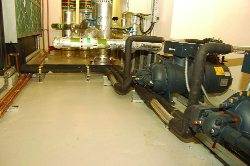Upgrading AHUs cuts costs at Canary Wharf

Upgrading 36 Mammoth air-handling units at Canary Wharf is expected to reduce the energy and maintenance costs of each unit by £7600 a year. The work is being carried out by Eton Associates.
A contract to upgrade 36 Mammoth packaged air-handling units has been awarded to Eton Associates by Canary Wharf Management. These units serve two buildings occupied by Barclays Capital, and the project is expected to reduce electricity consumption by 30%. These AHUs deliver air at 11°C and have a fan with variable-speed drive and two reciprocating compressors. The aim of the project is to improve the stability of the supply air temperature and upgrade the existing reciprocating compressors using R22 with units using the more environmentally friendly R417A, which is a direct replacement with zero ozone-depletion potential. Kevin Bright, Eton’s refrigerant specialist, chose screw compressors and developed a replacement strategy that would ensure building operation and business would not be affected in any way. One floor was selected for a test run. Following a period of preparation, the compressors were installed and commissioned over a weekend without affecting the supply of air to the floor at any time. Measurements before and after this upgrade showed a reduction in electricity consumption of 30%. When the project is completed, the estimated saving in electricity consumption will be 3300 MWh a year, amounting to £185 000. A £90 000 a year reduction in the cost of keeping 72 15-year-old compressors operational is also expected.
Related links:


